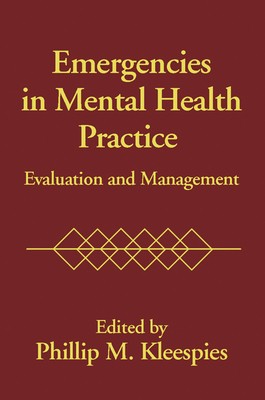
- We will send in 10–14 business days.
- Publisher: Guilford Publications
- ISBN-10: 1572305517
- ISBN-13: 9781572305519
- Format: 15.6 x 23.4 x 3 cm, softcover
- Language: English
- SAVE -10% with code: EXTRA
Emergencies in Mental Health Practice (e-book) (used book) | bookbook.eu
Reviews
Description
Focusing on acute clinical situations in which there is an imminent risk of serious harm or death to self or others, this practical resource helps clinicians evaluate and manage a wide range of mental health emergencies. Authors examine how to distinguish crises that are emergencies from those that are not, and provide basic instruction in crisis theory and emergency interviewing. The volume then provides guidelines for intervening with suicidal patients, potentially violent patients, and vulnerable victims of violence, as well as patients facing life-and-death medical decisions, with careful attention to risk management and forensic issues. Also addressed are emergency-related conditions including self-mutilation, alcohol and drug-related crises, adverse reactions to psychotropic medication, and psychological symptoms of medical conditions. Finally, chapters consider the effects of emergency intervention on clinicians and offer suggestions for managing stress.
EXTRA 10 % discount with code: EXTRA
The promotion ends in 19d.22:55:23
The discount code is valid when purchasing from 10 €. Discounts do not stack.
- Publisher: Guilford Publications
- ISBN-10: 1572305517
- ISBN-13: 9781572305519
- Format: 15.6 x 23.4 x 3 cm, softcover
- Language: English English
Focusing on acute clinical situations in which there is an imminent risk of serious harm or death to self or others, this practical resource helps clinicians evaluate and manage a wide range of mental health emergencies. Authors examine how to distinguish crises that are emergencies from those that are not, and provide basic instruction in crisis theory and emergency interviewing. The volume then provides guidelines for intervening with suicidal patients, potentially violent patients, and vulnerable victims of violence, as well as patients facing life-and-death medical decisions, with careful attention to risk management and forensic issues. Also addressed are emergency-related conditions including self-mutilation, alcohol and drug-related crises, adverse reactions to psychotropic medication, and psychological symptoms of medical conditions. Finally, chapters consider the effects of emergency intervention on clinicians and offer suggestions for managing stress.


Reviews